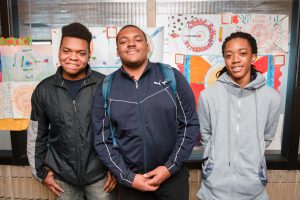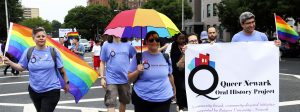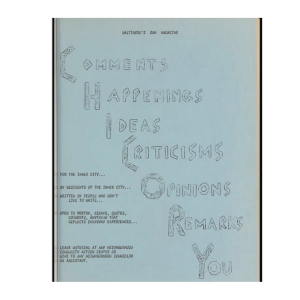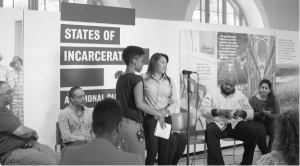History Department’s Public History Programs
For undergraduate and graduate students interested in public history, the history department at Rutgers University-Newark offers a number of opportunities.
Undergraduates can take classes like Introduction to Public History, and in topics including digital history, oral history, and LGBT history through archives. Internships at local historical sites, museums, and libraries give students practical experience in the field preparing them for careers or further graduate training.
For those who become interested in an MA in history while an undergrad, Rutgers University-Newark’s department of history offers highly qualified students the opportunity to earn a graduate degree in less time and with less cost than doing the two separately. In our accelerated bachelor’s/master’s degree program, students can take graduate courses in their senior year, while they are still enrolled as undergraduates. Learn more here.
Students in the MA or MAT program can take graduate classes in public history, such as Place, Community and Public Humanities, a project-centered course where students work collaboratively on a major public project. To learn more about the graduate program in history, including courses offered and requirements for admission, visit the website.
Graduate Program in American Studies
The biggest issues facing us today have deep historical roots. Solving them requires understanding cultural, linguistic, racial, gender, class, sexuality and other differences. The public humanities–connecting the qualitative study of the human experience to diverse publics–provides the scholarly knowledge base and the skills to work with communities across difference.
The MA in American Studies with a concentration in Public Humanities and the PhD in American Studies offer students opportunities to conduct scholarly work in service to the public.
The MA is a 30-credit curriculum that emphasizes practical skills, including grant writing, nonprofit administration, and project experience through classes, internship, and capstone. Learn more on our website. Students from this program have gone on to careers in public history including at institutions like the September 11 Museum, LaGuardia and Wagner Archives, Morris County Park System, and Seton Hall University Libraries.
The PhD program is appropriate for students who are interested in conducting original scholarly research. Many students in this program currently work in public humanities and expect to continue to do so after they complete the program. Graduate courses like Place, Community and Public Humanities and Black Digital Humanities offer students rigorous training in the theories and methods of American Studies while developing skills in project management. Learn more on our website.
Telling Untold Histories
We all tell stories. But how we tell those stories changes depending on who and where we are and on the conditions of our lives and institutions. People of color, women, LGBTQ and gender nonconforming people, and people with differing abilities have used various strategies–from whisper networks and kitchen conversations to protests and public demonstrations–to speak truth when society prefer they remain silent. Either way can make change, but as Maya Angelou wrote, “There is no greater agony than bearing an untold story inside you.”
For five years, Telling Untold Histories – New Jersey’s annual unconference that looks for human stories yet to be told – brought together public historians, artists, activists, students, educators and community members to examine how we tell stories about the past. Using a radically democratic format where attendees define the sessions on the morning of the unconference and by offering skill-based workshops, this event encouraged collaboration and empowered communities to tell their own stories and strengthened cultural and historical institutions so that they are able to reflect the diversity of our communities in the past and present in the narratives they tell.
Supported by an array of cultural and historical organizations throughout the state of New Jersey, Telling Untold Histories connected hundreds of people in the tri-state area around the issue of inclusive public history. See our website to find notes from every unconference.
Queer Newark Oral History Project
 The Queer Newark Oral History Project (QNOHP) was founded in the summer of 2011 by Darnell Moore, an activist and writer and the first chair of the City of Newark’s Advisory Commission on LGBTQ Concerns, Beryl Satter, a history professor at Rutgers University-Newark, and Christina Strasburger, the administrator of the Departments of History and African American and African Studies at Rutgers University-Newark. Bringing together Newark’s LGBTQ activists, high school students, artists, church leaders, professors, administrators and university staff, Moore and Satter convened a series of focused discussions with the goal of developing an initiative to collect and preserve the history of LGBTQ and gender-nonconforming communities in Newark. The term “queer” was chosen for the name of the project to showcase the resilience of an often-invisible population of Newarkers whose lives reflected sexual and gender diversity, whether or not they adopted LGBTQ identities.
The Queer Newark Oral History Project (QNOHP) was founded in the summer of 2011 by Darnell Moore, an activist and writer and the first chair of the City of Newark’s Advisory Commission on LGBTQ Concerns, Beryl Satter, a history professor at Rutgers University-Newark, and Christina Strasburger, the administrator of the Departments of History and African American and African Studies at Rutgers University-Newark. Bringing together Newark’s LGBTQ activists, high school students, artists, church leaders, professors, administrators and university staff, Moore and Satter convened a series of focused discussions with the goal of developing an initiative to collect and preserve the history of LGBTQ and gender-nonconforming communities in Newark. The term “queer” was chosen for the name of the project to showcase the resilience of an often-invisible population of Newarkers whose lives reflected sexual and gender diversity, whether or not they adopted LGBTQ identities.
The project has been marked by a threefold commitment to public programming, academic research, and the development of a publicly accessible archive of oral history interviews and documents concerning the rich history of LGBTQ Newark. We have developed a Queer Newark Walking Tour of downtown Newark that highlights the hidden history of queer life in the city. Contact us at queernk@newark.rutgers.edu to arrange a tour.
Our podcast peaks behind the curtain to discuss the oral history interview process. Transgender Voices is a curated collection of interview clips by transgender narrators about identity, art, and activism.
At Home in Newark: Stories from the Queer Newark Oral History Project
The traveling multimedia exhibit, At Home In Newark: Stories from the Queer Newark Oral History Project, tells the stories of how LGBTQ Newarkers have claimed space for themselves in bars, balls, houses of worship, street corners, community centers, and artistic venues in the face of poverty, violence, illness, racism and discrimination. Through their activism, creative expression, and determination, they have made Newark their home. Institutions including the Newark Public Library, Audible.com, Rutgers University and Newark Beth Israel Medical Center have hosted the exhibit. Contact queernk@newark.rutgers.edu to bring the exhibit to your site.
This traveling exhibit was curated by students in Dr. Mary Rizzo’s American Studies and History class, Place, Community and Public Humanities at Rutgers University-Newark, in collaboration with a graphic design class, a team of community advisors, the Newark LGBTQ Community Center, and the Rutgers-Newark LGBTQ & Intercultural Resource Center.
Chicory Revitalization Project
The Chicory Revitalization Project (CRP) is an initiative to revitalize the East Baltimore-based, Black Arts Movement era poetry and art magazine Chicory via an intergenerational collation of artists, educators, and community scholars. Chicory was initially published by the Enoch Pratt Free Library from 1966 to 1983 and it served as a place for beleaguered Baltimoreans to express the array of emotions, experiences, and exchanges that shaped and emerged from the city during this tenuous time. Initially part of the federally funded War on Poverty, Chicory was different from a traditional literary magazine. Inaugural editor, local poet Sam Cornish, billed the publication as being “For the inner city…by residents of the inner city…written by people who don’t like to write…open to poetry, essays, quotes, comments, anything that reflects everyday experiences…”
Today, the CRP strives to enliven Chicory as a historical resource with power for contemporary change. A growing social media presence on Instagram (@chicory_baltimore) has increased the project’s reach and allowed for non-traditional engagement with a variety of local communities. Teachers at all levels have begun using Chicory content in their classrooms to incite critical engagement with literature as historical evidence. Collaborations on community-led events have introduced Chicory and its many possibilities to youth writers, activists, and organizations seeking to make Baltimore a better place to live, learn, and grow.
Humanities Action Lab
 The Humanities Action Lab (HAL) is a coalition of universities, issue organizations, and public spaces in 40 cities, and growing, led from Rutgers University-Newark, that collaborate to produce community-curated public humanities projects on urgent social issues. Students and stakeholders in each city develop local chapters of international traveling exhibits, web projects, public programs, and other platforms for civic engagement, all made possible by our visionary supporters. Projects travel nationally and internationally to museums, public libraries, cultural centers, and other spaces in each of the communities that helped create them.
The Humanities Action Lab (HAL) is a coalition of universities, issue organizations, and public spaces in 40 cities, and growing, led from Rutgers University-Newark, that collaborate to produce community-curated public humanities projects on urgent social issues. Students and stakeholders in each city develop local chapters of international traveling exhibits, web projects, public programs, and other platforms for civic engagement, all made possible by our visionary supporters. Projects travel nationally and internationally to museums, public libraries, cultural centers, and other spaces in each of the communities that helped create them.
The current exhibit, Climates of Inequality, is now touring. We always welcome new institutions to join our projects, so please get involved, or reach out if you have any questions.
Newest Americans
Newest Americans is a multimedia collaboratory of journalists, media-makers, artists, faculty and students telling the stories that radiate from the most diverse university in the nation. Based in Newark, NJ, a city shaped by migration, our project affords a glimpse into the world of the newest Americans and a vision of our demographic future.
Newest Americans is produced by the Center for Migration and the Global City, and faculty in the Department of Arts, Culture and Media at Rutgers University Newark in partnership with VII Photo and Talking Eyes Media. We have a large body of contributors and co-conspirators who are credited in the masthead and at the end of each story.
See the projects tab for more exciting initiatives.
